The 280's decade ran from January 1, 280, to December 31, 289.

The Great Game was a rivalry between the 19th-century British and Russian empires over influence in Central Asia, primarily in Afghanistan, Persia, and Tibet. The two colonial empires used military interventions and diplomatic negotiations to acquire and redefine territories in Central and South Asia. Russia conquered Turkestan, and Britain expanded and set the borders of British colonial India. By the early 20th century, a line of independent states, tribes, and monarchies from the shore of the Caspian Sea to the Eastern Himalayas were made into protectorates and territories of the two empires.
Khan is a historic Mongolic and Turkic title originating among nomadic tribes in the Central and Eastern Eurasian Steppe to refer to a king. It first appears among the Rouran and then the Göktürks as a variant of khagan and implied a subordinate ruler. In the Seljük Empire, it was the highest noble title, ranking above malik (king) and emir (prince). In the Mongol Empire it signified the ruler of a horde (ulus), while the ruler of all the Mongols was the khagan or great khan. The title subsequently declined in importance. During the Safavid and Qajar dynasty it was the title of an army general high noble rank who ruling a province, and in Mughal India it was a high noble rank restricted to courtiers. After the downfall of the Mughals it was used promiscuously and became a surname. Khan and its female forms occur in many personal names, generally without any nobiliary of political relevance, although it remains a common part of noble names as well.

The Ilkhanate or Il-khanate, ruled by the Il-Khans or Ilkhanids, and known to the Mongols as Hülegü Ulus, was a Mongol khanate founded in the southwestern territories of the Mongol Empire. The Ilkhanid realm was officially known as the Land of Iran or simply Iran. It was established after Hülegü, the son of Tolui and grandson of Genghis Khan, inherited the West Asian part of the Mongol Empire after his brother Möngke Khan died in 1259.
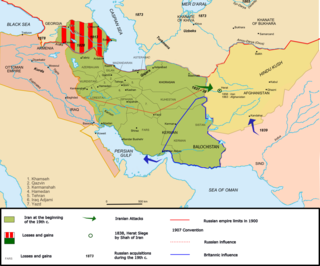
The Anglo-Russian Convention of 1907, or Convention between the United Kingdom and Russia relating to Persia, Afghanistan, and Tibet, was signed on August 31, 1907, in Saint Petersburg. It ended the longstanding rivalry in Central Asia and enabled the two countries to outflank the Germans, who were threatening to connect Berlin to Baghdad with a new railroad that could potentially align the Ottoman Empire with Imperial Germany.

The Treaty of Georgievsk was a bilateral treaty concluded between the Russian Empire and the east Georgian kingdom of Kartli-Kakheti on July 24, 1783. The treaty established eastern Georgia as a protectorate of Russia, which guaranteed its territorial integrity and the continuation of its reigning Bagrationi dynasty in return for prerogatives in the conduct of Georgian foreign affairs. By this, eastern Georgia abjured any form of dependence on Persia or another power, and every new Georgian monarch of Kartli-Kakheti would require the confirmation and investiture of the Russian tsar.

Greater Khorāsān or Khorāsān or Khurāsān is a historical eastern region in the Iranian Plateau between West and Central Asia that encompasses western and northern Afghanistan, northeastern Iran, the eastern halves of Turkmenistan and Uzbekistan, western Tajikistan, and portions of Kyrgyzstan and Kazakhstan.
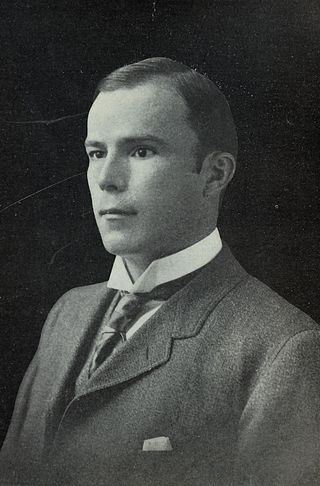
William Morgan Shuster, was an American lawyer, civil servant, and publisher, who is best known as the treasurer-general of Persia by appointment of the Iranian parliament, or Majles, from May to December 1911.
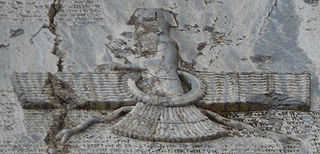
Greater Iran or Greater Persia, also called the Iranosphere or the Persosphere, is an expression that denotes a wide socio-cultural region comprising parts of West Asia, the Caucasus, Central Asia, South Asia, and East Asia —all of which have been affected, to some degree, by the Iranian peoples and the Iranian languages. It is defined by having been long ruled by the dynasties of various Iranian empires, under whom the local populaces gradually incorporated some degree of Iranian influence into their cultural and/or linguistic traditions; or alternatively as where a considerable number of Iranians settled to still maintain communities who patronize their respective cultures, geographically corresponding to the areas surrounding the Iranian plateau. It is referred to as the "Iranian Cultural Continent" by Encyclopædia Iranica.
The composite Turko-Persian, Turco-Persian, or Turco-Iranian is the distinctive culture that arose in the 9th and 10th centuries AD in Khorasan and Transoxiana. According to the modern historian Robert L. Canfield, the Turco-Persian tradition was Persianate in that it was centered on a lettered tradition of Iranian origin; it was Turkic in so far as it was for many generations patronized by rulers of Turkic ancestry; and it was "Islamicate" in that Islamic notions of virtue, permance, and excellence infused discourse about public issues as well as the religious affairs of the Muslims, who were the presiding elite."
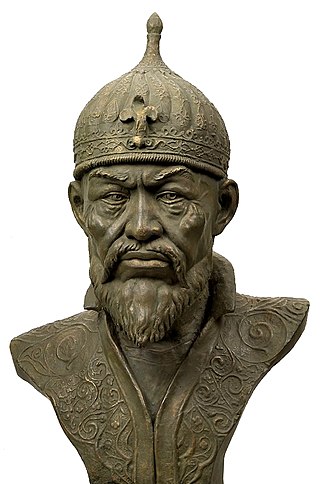
Timur, also known as Tamerlane, was a Turco-Mongol conqueror who founded the Timurid Empire in and around modern-day Afghanistan, Iran, and Central Asia, becoming the first ruler of the Timurid dynasty. An undefeated commander, he is widely regarded as one of the greatest military leaders and tacticians in history, as well as one of the most brutal and deadly. Timur is also considered a great patron of art and architecture as he interacted with intellectuals such as Ibn Khaldun, Hafez, and Hafiz-i Abru and his reign introduced the Timurid Renaissance.
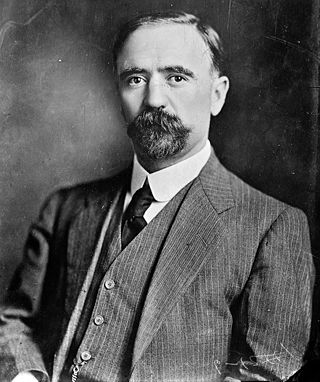
The following events occurred in February 1911:
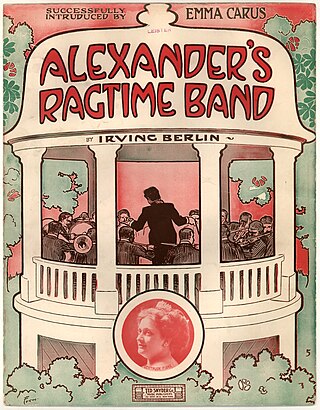
The following events occurred in April 1911:

The following events occurred in May 1911:

The following events occurred in July 1911:

The following events occurred in September 1911:

The following events occurred in October 1911:

The following events occurred in November 1911:

The following events occurred in January 1912:

Chovgan, Chowgan or Chogan, is a team sport with horses that originated in ancient Iran. It was considered an aristocratic game and held in a separate field, on specially trained horses. The game was widespread among the Asian peoples. It is played in Iran, Azerbaijan, Tajikistan, and Uzbekistan.



















